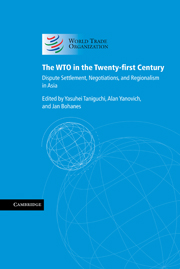Book contents
- Frontmatter
- Contents
- Notes on contributors
- Acknowledgements
- Table of dispute settlement cases and reports
- List of abbreviations
- Introduction
- PART I The WTO at Ten
- PART II Accomplishments and Future Prospects of the WTO Dispute Settlement System
- PART III Asian Perspectives on WTO Dispute Settlement
- PART IV The Doha Development Agenda and Beyond
- 16 The central place of market access for the WTO's development round
- 17 Agricultural issues in the Doha Development Agenda negotiations
- 18 Beyond Doha: reflections on the future of trade remedies
- 19 Reflections on the relationship between WTO negotiations and dispute settlement: lessons from the GATS
- 20 Trade in services and sustainable development in the context of the WTO: the case of higher education
- 21 The WTO and sustainable development
- PART V Asian Regional Integration and the Multilateral Trading System
- Index
21 - The WTO and sustainable development
from PART IV - The Doha Development Agenda and Beyond
Published online by Cambridge University Press: 05 March 2012
- Frontmatter
- Contents
- Notes on contributors
- Acknowledgements
- Table of dispute settlement cases and reports
- List of abbreviations
- Introduction
- PART I The WTO at Ten
- PART II Accomplishments and Future Prospects of the WTO Dispute Settlement System
- PART III Asian Perspectives on WTO Dispute Settlement
- PART IV The Doha Development Agenda and Beyond
- 16 The central place of market access for the WTO's development round
- 17 Agricultural issues in the Doha Development Agenda negotiations
- 18 Beyond Doha: reflections on the future of trade remedies
- 19 Reflections on the relationship between WTO negotiations and dispute settlement: lessons from the GATS
- 20 Trade in services and sustainable development in the context of the WTO: the case of higher education
- 21 The WTO and sustainable development
- PART V Asian Regional Integration and the Multilateral Trading System
- Index
Summary
The relationship between trade and sustainable development is complex and challenging. In this chapter, I shall focus on one component of that challenge: the relationship between trade and environment. I shall argue that, contrary to general opinion, the environment has made significant progress in the World Trade Organization (WTO). This arises not so much from the progress in environmentally-related negotiations nor from the regular work of the WTO Committee on Trade and Environment (CTE), but from the work of the Dispute Settlement Body (DSB) and, in particular, the Appellate Body. While this has led to charges of ‘judicial activism’ on the part of the Appellate Body, I argue that the Appellate Body is simply fulfilling its mandate to clarify and interpret WTO law and to fill gaps left by negotiators.
Environment: a fraught topic in the WTO
Environment is a sensitive topic in the trade context. Although the fear is receding somewhat, the environmental community is still concerned that trade rules will be used to challenge and roll back environmental achievement at both the international and domestic levels. At the domestic level, to the extent that environmental regulations, norms or standards impinge on the freedom to conduct business, they are vulnerable to challenge as unwarranted interference with open trade. At the international level, multilateral environmental agreements (MEAs) that use trade measures to encourage and enforce compliance appear especially open to challenge, even though the trade measures contained in these agreements have been agreed by consensus by all parties and many of these agreements have more members than the WTO itself.
- Type
- Chapter
- Information
- The WTO in the Twenty-first CenturyDispute Settlement, Negotiations, and Regionalism in Asia, pp. 395 - 406Publisher: Cambridge University PressPrint publication year: 2007



